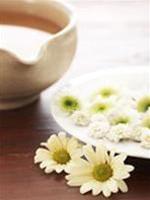Tea is a popular beverage, serving as both a refreshing drink and a means to cool down, helping to induce sweating while also hydrating the body.
 |
|
(Image: eecs.berkeley) |
In addition to serving as a drink, when combined with medicinal herbs (known as herbal tea), tea can be very effective in preventing and treating various ailments.
Here are some simple herbal teas that are easy to prepare.
Ginger Tea
Take 7g of tea leaves and 10 slices of fresh ginger (peeled); boil them and drink after meals to relieve colds, induce sweating, and treat colds, flu, prolonged cough, and high blood pressure.
Ginger tea also helps soothe sore throats, promotes lung health, and is easy to drink, with a fragrant and sweet flavor. According to Traditional Chinese Medicine, fresh ginger (Sheng Jiang) has a spicy flavor and a warm nature, entering the three meridians: the lung, spleen, and stomach.
Salt Tea
Take 3g of tea leaves and 1g of salt; steep in boiling water and drink hot. This tea brightens the eyes, clears heat, and reduces inflammation.
During summer, it should be consumed regularly to prevent electrolyte imbalance due to excessive sweating. Salt has a salty taste and a cooling nature, entering the three meridians: the kidney, heart, and spleen.
For office workers who sweat less, use only half the amount of salt (0.5g); those with high blood pressure should avoid it.
Sugar Tea
Take 15g of green tea and 60g of white sugar; steep with 2 bowls of boiling water and leave outside overnight (covered with a cloth). In the morning, drink it all. This tea helps with blood circulation, regulates menstruation, and treats menstrual irregularities.
Hawthorn Tea
Take 10 hawthorn slices, crush them, and boil; strain the water to steep with tea leaves. Drinking this regularly can lower blood pressure, reduce blood fat, and aid in weight loss. Additionally, it treats high blood pressure and heart problems. According to Traditional Chinese Medicine, hawthorn has a sweet-sour taste and a warm nature, entering the three meridians: spleen, stomach, and liver.
Onion Tea
Take 10g of green tea, 10g of white angelica, and 3 stalks of onion; boil and drink hot. This tea treats flu symptoms. Onion is a commonly used remedy among the public. It has a spicy flavor, is neutral, and non-toxic. Onion promotes blood circulation, helps with pregnancy, improves eyesight, and nourishes the five organs.
Rice Tea
Take 100g of rice and 6g of tea leaves; wash them, steep in boiling water for 6 minutes, then use the tea water to cook rice, consuming once a day. This tea helps regulate digestion and alleviates bloating and indigestion.
Garlic Tea
 |
|
(Image: TTO) |
Take 1 clove of garlic and crush it, 60g of tea brewed with boiling water to drink throughout the day, and continue for 7 days. This remedy is effective for treating chronic amoebic dysentery, clearing heat and detoxifying the body, disinfecting, and relieving phlegm. Garlic has a spicy flavor and is warm in nature, entering the liver and stomach meridians.
Chrysanthemum Tea
Take 9g of green tea leaves and 6g of white chrysanthemum flowers, brew them with boiling water and let cool. This tea helps nourish the liver, improve eyesight, relieve headaches, treat conjunctivitis, and manage high blood pressure. Chrysanthemum has a pungent, numbing, and warming flavor. This medicinal herb has been commonly used in folk medicine for a long time.
Honey Tea
Place tea leaves in a cloth bag, pour boiling water over them to steep, and mix one tablespoon of honey into a cup of tea. Hold the tea in your mouth for 3 minutes before swallowing. This remedy is effective for treating sore throat, oral thrush, gum inflammation, and periodontal disease.
The above are types of medicinal teas that are highly effective for preventing and treating common ailments.


















































